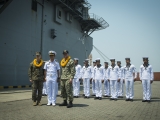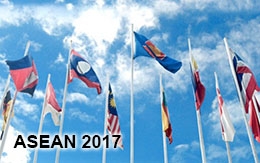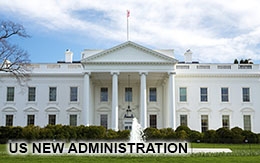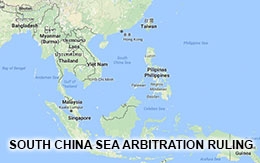Search result for "PLA"
-
Why Vanguard Bank and Why Now? Explaining Chinese Behavior in the South China Sea
Category: PoliticsDuring the course of my recent discussions with Vietnamese interlocutors, one question has recurred: after a period of prolonged quiet in Vietnam-China relations in the South China Sea (SCS), why has Beijing all of a sudden decided to take a stand at Vanguard Bank? And one could easily further ask why at the same time Beijing opened a new front by conducting a major military exercise at the Paracel Islands? I think there are several components to answering these questions. First, although Vanguard Bank represents the worst Vietnam-China tensions in the SCS since the Haiyang Shiyou 981 oil rig standoff in May ... -
Playing by the rules in Asia
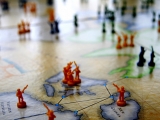 Category: PoliticsIn Australia’s case, this means thinking again about some of our efforts to limit our exposure to the International Court of Justice and certain dispute-resolution mechanisms under UNCLOS. In this imperfect world, there is considerable tolerance for all sorts of imperfect behavior.
Category: PoliticsIn Australia’s case, this means thinking again about some of our efforts to limit our exposure to the International Court of Justice and certain dispute-resolution mechanisms under UNCLOS. In this imperfect world, there is considerable tolerance for all sorts of imperfect behavior. -
China warns BBC plane away from artificial SCS island
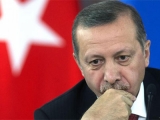 Category: PoliticsA small plane chartered by a BBC news crew drew a warning from the Chinese navy after it flew near a Chinese-built artificial island in the South China Sea, according to a recent report. A small plane chartered by a BBC news crew drew a warning from the Chinese navy after it flew near a Chinese-built artificial island in the South China Sea, according to a recent report. A small plane chartered by a BBC news crew drew a warning from the Chinese navy after it flew near a Chinese-built artificial island in the South China Sea, according to a recent report.
Category: PoliticsA small plane chartered by a BBC news crew drew a warning from the Chinese navy after it flew near a Chinese-built artificial island in the South China Sea, according to a recent report. A small plane chartered by a BBC news crew drew a warning from the Chinese navy after it flew near a Chinese-built artificial island in the South China Sea, according to a recent report. A small plane chartered by a BBC news crew drew a warning from the Chinese navy after it flew near a Chinese-built artificial island in the South China Sea, according to a recent report. -
Emission Reduction From Shipping And Net-Zero Shipping: Review On Southeast Asia Regional Policy
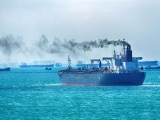 Category: EnvironmentThe work to develop legally binding measures to reduce air pollution from ships was an invitation in accordance to Article 212 of the United Nations Convention on the Law of the Sea, 1982 (UNCLOS), resolution A.719(17). As a result, IMO made a decision to include the regulation on energy efficiency for ships in the MARPOL Annex VI where it stipulates the requirements on the Energy Efficiency Design Index (EEDI) and the Ship Energy Efficiency Management Plan (SEEMP). This regulation came into force in 2013
Category: EnvironmentThe work to develop legally binding measures to reduce air pollution from ships was an invitation in accordance to Article 212 of the United Nations Convention on the Law of the Sea, 1982 (UNCLOS), resolution A.719(17). As a result, IMO made a decision to include the regulation on energy efficiency for ships in the MARPOL Annex VI where it stipulates the requirements on the Energy Efficiency Design Index (EEDI) and the Ship Energy Efficiency Management Plan (SEEMP). This regulation came into force in 2013 -
Beijing’s Naval Posture in the South China Sea: A Post-Pandemic Update
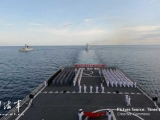 Category: SecurityThis short paper seeks to highlight key updates on naval developments in the SCS since the start of COVID-19. But why specifically “naval” when coastguards appear to be on the front page of recent incidents in the disputed waters? The key development of concern here is how the PLA Navy has become a more assertive actor in Beijing’s quest to push its maritime sovereignty and rights in the SCS. The Southern Theater Command Navy is tasked with both SCS sovereignty and rights protection, and covering Taiwan in times of war. In recent times, this fleet has become a focus of attention for ...
Category: SecurityThis short paper seeks to highlight key updates on naval developments in the SCS since the start of COVID-19. But why specifically “naval” when coastguards appear to be on the front page of recent incidents in the disputed waters? The key development of concern here is how the PLA Navy has become a more assertive actor in Beijing’s quest to push its maritime sovereignty and rights in the SCS. The Southern Theater Command Navy is tasked with both SCS sovereignty and rights protection, and covering Taiwan in times of war. In recent times, this fleet has become a focus of attention for ... -
Will German ship’s South China Sea presence undermine regional security as China says?Category: SecurityGermany's plan to deploy naval ship in the Indo-Pacific does not change its neutral position in the South China Sea dispute, is a careful practice of international law, and therefore will not erode regional stability nor any littoral country's sovereignty as China might have suggested.
-
The ASEAN’s Achilles Heel: Institutional Deficit and Leadership Vacuum Amid China’s South China Sea Aggression
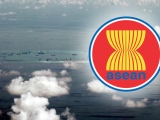 Category: Politics“The size of China’s displacement of the world balance is such that the world must find a new balance,” warned the late Singaporean leader Prime Minister Lee Kuan Yew. “It is not possible to pretend that this is just another big player. This is the biggest player in the history of the world.”
Category: Politics“The size of China’s displacement of the world balance is such that the world must find a new balance,” warned the late Singaporean leader Prime Minister Lee Kuan Yew. “It is not possible to pretend that this is just another big player. This is the biggest player in the history of the world.” -
China’s Misstep in the South China Sea
 Category: PoliticsIn a snap shot, while China can gain some ground in short term by flexing its muscle, it would risk greater backlash from its neighbors and collective actions from the international community in the long run. China should not interpret regional countries’ patience and restraint as signs of weakness and accommodation but gestures of goodwill to prompt second, constructive thinking. After all, its unlawful activities will soon meet up with resistance from directly involved nations. Futhermore, overplaying its hand would eventually prompt strategic realignments across the board to weaken its power foundation.
Category: PoliticsIn a snap shot, while China can gain some ground in short term by flexing its muscle, it would risk greater backlash from its neighbors and collective actions from the international community in the long run. China should not interpret regional countries’ patience and restraint as signs of weakness and accommodation but gestures of goodwill to prompt second, constructive thinking. After all, its unlawful activities will soon meet up with resistance from directly involved nations. Futhermore, overplaying its hand would eventually prompt strategic realignments across the board to weaken its power foundation. -
Viewing Maritime Forces Modernization in the Asia-Pacific in Perspective
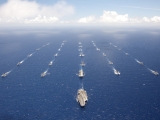 Category: Most prominent newsMaritime force buildup cannot be seen in quantitative terms only. In the foreseeable future, Asia-Pacific navies will continue to gravitate towards large, multi-role surface and subsurface platforms that exist in smaller numbers but being each vastly more superior than their older predecessors.
Category: Most prominent newsMaritime force buildup cannot be seen in quantitative terms only. In the foreseeable future, Asia-Pacific navies will continue to gravitate towards large, multi-role surface and subsurface platforms that exist in smaller numbers but being each vastly more superior than their older predecessors. -
Viewing Maritime Forces Modernization in the Asia-Pacific in Perspective
 Category: SecurityExpanding the Code for Unplanned Encounters at Sea, which was signed between 21 navies during the Western Pacific Naval Symposium in Qingdao back in April 2014, to maritime law enforcement agencies, irregular maritime forces and submarines appears a more practical way forward to ameliorate the risks of maritime forces buildup in the Asia-Pacific.
Category: SecurityExpanding the Code for Unplanned Encounters at Sea, which was signed between 21 navies during the Western Pacific Naval Symposium in Qingdao back in April 2014, to maritime law enforcement agencies, irregular maritime forces and submarines appears a more practical way forward to ameliorate the risks of maritime forces buildup in the Asia-Pacific. -
The 9th South China Sea Conference: Cooperation for Regional Security and Development
Category: VideosThe 9th South China Sea International Conference: “Cooperation for Regional Security and Development” hosted by the Diplomatic Academy of Vietnam (DAV), the Foundation for East Sea Studies (FESS) and the Vietnam Lawyers’ Association (VLA) took place at Ho Chi Minh City on 27-28 November, 2017. -
Shangri-La Dialogue 2017: the South China Sea and the end of a Rules-Based Order?
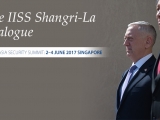 Category: PoliticsA key focal point of discussions at the June 2017 Shangri-La Dialogue (Security Summit) in Singapore was China and its actions in the South China Sea. Both the opening keynote address and the first two plenary sessions implicitly and/or explicitly responded to Beijing’s construction and militarisation of artificial islands in the area and, for this purpose, placed a significant amount of emphasis on the need to maintain a rules-based order.
Category: PoliticsA key focal point of discussions at the June 2017 Shangri-La Dialogue (Security Summit) in Singapore was China and its actions in the South China Sea. Both the opening keynote address and the first two plenary sessions implicitly and/or explicitly responded to Beijing’s construction and militarisation of artificial islands in the area and, for this purpose, placed a significant amount of emphasis on the need to maintain a rules-based order. -
The East China Sea: Chinese Efforts to Establish a “New Normal” and Prospects for Peaceful Management
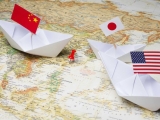 Category: PoliticsAs the world turns its attention from Chinese militarization of the South China Sea islets to North Korean nuclear and missile provocations, China is making every effort to establish a “new normal” in the East China Sea with more frequent military and paramilitary presence and more offshore gas platforms construction there.
Category: PoliticsAs the world turns its attention from Chinese militarization of the South China Sea islets to North Korean nuclear and missile provocations, China is making every effort to establish a “new normal” in the East China Sea with more frequent military and paramilitary presence and more offshore gas platforms construction there. -
The South China Sea and China-US Relations: Beijing’s Perspective
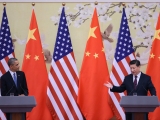 Category: PoliticsOver the last few years the South China Sea (SCS) dispute has become a chief point of friction between Beijing and Washington, causing widespread apprehensions of an emerging Sino–US rivalry that could unsettle the long peace and stability that the region has enjoyed since the 1970s. While there have long been differences between the two countries in their positions in the SCS – and unlike issues such as Taiwan, Tibet, and even trade disputes until recently – the SCS dispute has never assumed such a central place in the bilateral relationship as it is today.
Category: PoliticsOver the last few years the South China Sea (SCS) dispute has become a chief point of friction between Beijing and Washington, causing widespread apprehensions of an emerging Sino–US rivalry that could unsettle the long peace and stability that the region has enjoyed since the 1970s. While there have long been differences between the two countries in their positions in the SCS – and unlike issues such as Taiwan, Tibet, and even trade disputes until recently – the SCS dispute has never assumed such a central place in the bilateral relationship as it is today. -
The South China Sea and China-US Relations: Beijing’s Perspective
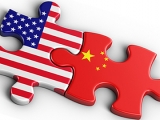 Category: Working PapersOver the last few years the South China Sea dispute has become a chief point of friction between Beijing and Washington, causing widespread apprehensions of an emerging Sino–US rivalry that could unsettle the long peace and stability that the region has enjoyed since the 1970s. While there have long been differences between the two countries in their positions in the SCS – and unlike issues such as Taiwan, Tibet, and even trade disputes until recently – the SCS dispute has never assumed such a central place in the bilateral relationship as it is today.
Category: Working PapersOver the last few years the South China Sea dispute has become a chief point of friction between Beijing and Washington, causing widespread apprehensions of an emerging Sino–US rivalry that could unsettle the long peace and stability that the region has enjoyed since the 1970s. While there have long been differences between the two countries in their positions in the SCS – and unlike issues such as Taiwan, Tibet, and even trade disputes until recently – the SCS dispute has never assumed such a central place in the bilateral relationship as it is today. -
Mechanisms for Managing the South China Sea Tensions
Category: VideosThere are already a number of mechanisms in place for managing the South China Sea tensions. While these mechanisms in some extent managed to prevent tensions from escalating into conflicts, most are perceived as having overlapping functions. Besides, there are legitimate complaints that gaps still exist and that a number of global and regional institutions have not yet fully or partly utilized. At the same time, international good practices in semi-closed seas have not been fully explored for potential application in the South China Sea. This session examines the current state of regional security structures in dealing with South China Sea ... -
The political Economy of the South China Sea: Issues and Prospects
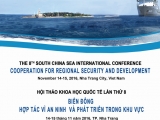 Category: VideosThis session explores critical economic and environmental issues in the South China Sea. A range of factors have impacted on the political economy of the South China Sea, including the falling price of energy, the depletion of fish stocks, and substantial environmental degradation caused by human activities. Pertinent to the discussion on these issues are analyses of regional countries’ development plans and foreign policy agendas, most notably China’s Maritime Silk Road initiative. The session examines how the need for improved infrastructure, access to maritime resources and commons, and legal obligations to cooperation for environmental protection have affected the resolution and management ...
Category: VideosThis session explores critical economic and environmental issues in the South China Sea. A range of factors have impacted on the political economy of the South China Sea, including the falling price of energy, the depletion of fish stocks, and substantial environmental degradation caused by human activities. Pertinent to the discussion on these issues are analyses of regional countries’ development plans and foreign policy agendas, most notably China’s Maritime Silk Road initiative. The session examines how the need for improved infrastructure, access to maritime resources and commons, and legal obligations to cooperation for environmental protection have affected the resolution and management ... -
Storm clouds gather over South China Sea ahead of key U.N. ruling
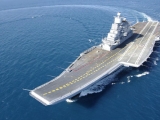 Category: PoliticsSigns that China may be contemplating another bout of island-building in the South China Sea ahead of an important U.N. ruling on the issue have provoked the United States to step up its vigilance in the region in recent days.
Category: PoliticsSigns that China may be contemplating another bout of island-building in the South China Sea ahead of an important U.N. ruling on the issue have provoked the United States to step up its vigilance in the region in recent days. -
Patrolling International Skies: Understanding Joint Air Patrols
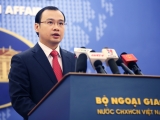 Category: ArchiveTwo PLAN vessels, the Lanzhou (a Type 052C missile destroyer) and Taizhou (a Type 053 frigate), shadowed theLassen and issued warnings to get out of the waters around Subi, but apparently did not interfere with the operation. Since U.S. media has been reporting that the Obama administration was considering conducting a FON operation for the past six months,
Category: ArchiveTwo PLAN vessels, the Lanzhou (a Type 052C missile destroyer) and Taizhou (a Type 053 frigate), shadowed theLassen and issued warnings to get out of the waters around Subi, but apparently did not interfere with the operation. Since U.S. media has been reporting that the Obama administration was considering conducting a FON operation for the past six months, -
Chris Johnson Previews Xi Jinping's Visit
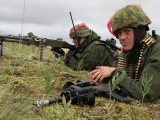 Category: SecurityFON operations are not primarily about military deterrence or diplomatic messaging, though in a politically charged atmosphere like the South China Sea those play a role. At its root, FON operations are legal exercises to reinforce the United States’—and in this case the overwhelming majority of the international community’s—interpretations of international maritime law. T
Category: SecurityFON operations are not primarily about military deterrence or diplomatic messaging, though in a politically charged atmosphere like the South China Sea those play a role. At its root, FON operations are legal exercises to reinforce the United States’—and in this case the overwhelming majority of the international community’s—interpretations of international maritime law. T -
Reinforced seawalls
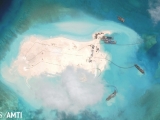 Category: SecurityCuarteron Reef, located in the London Reefs, was also the site of significant dredging and construction during the summer months of 2014. Prior to this time, the reef held a concrete supply platform with communications equipment and radars, like many of China’s other land features in the Spratly Islands. As imagery from November 2014 demonstrates, China has since built an artificial island at Cuarteron and is also building structures on the island.
Category: SecurityCuarteron Reef, located in the London Reefs, was also the site of significant dredging and construction during the summer months of 2014. Prior to this time, the reef held a concrete supply platform with communications equipment and radars, like many of China’s other land features in the Spratly Islands. As imagery from November 2014 demonstrates, China has since built an artificial island at Cuarteron and is also building structures on the island.
© 2016 Maritime Issues


